BlueHost vs Elementor: Final verdict
BlueHost and Elementor both offer robust website building solutions, but they cater to different user needs and preferences.
-
BlueHost (Overall Grade: 6.8/10)
is a comprehensive web hosting service that includes a user-friendly website builder. It integrates seamlessly with WordPress, offering a wide range of customization options and access to thousands of themes and plugins. BlueHost is ideal for users looking for an all-in-one solution that combines hosting and website building, especially those who prefer using WordPress. However, it may not offer the same level of design flexibility and advanced features as Elementor. -
Elementor (Overall Grade: 7.4/10)
is a powerful website builder plugin for WordPress, known for its flexibility and extensive customization options. It provides a visual drag-and-drop interface, making it suitable for both beginners and professional web designers. Elementor excels in design functionalities, ease of use, and AI capabilities, making it a preferred choice for users who want to create highly customized and visually appealing websites. When comparing BlueHost vs Elementor, Elementor stands out for its advanced features and user-friendly design tools.

|

|
|
|---|---|---|
|
Design functionalities & templates |
7.2 |
9.2 |
|
Ease of use |
8.2 |
8.8 |
|
Ecommerce |
6.8 |
7.6 |
|
Website Editors |
7.3 |
8.5 |
|
Product testing options |
6.2 |
5.6 |
|
Price |
7.2 |
8.0 |
|
Hosting quality |
8.0 |
7.8 |
|
Website speed optimization |
6.5 |
6.7 |
|
Plugins and integrations |
9.1 |
7.6 |
|
Marketing features |
7.3 |
7.8 |
|
Customer support |
7.6 |
7.2 |
|
Security |
8.3 |
9.1 |
|
AI capabilities |
1.5 |
7.4 |
|
User Management |
4.4 |
8.8 |
Which one is the best for ecommerce: BlueHost or Elementor?
 6.8
6.8
 7.6
7.6
Verdict
: Elementor is the superior choice for ecommerce due to its extensive customization options and robust integration with WooCommerce, making it ideal for users seeking flexibility and advanced features. BlueHost, while versatile and user-friendly, is better suited for simpler ecommerce needs.
-
BlueHost
: BlueHost offers a solid foundation for ecommerce with features like product listings, secure payment gateways, and inventory management. Its integration with WooCommerce provides additional ecommerce functionalities, but it may lack the depth and flexibility required for more complex online stores. BlueHost is a good option for those who need a straightforward, easy-to-use platform with reliable hosting services. -
Elementor
: Elementor excels in ecommerce with its customizable product pages, diverse ecommerce widgets, and seamless WooCommerce integration. It offers extensive design flexibility, allowing users to create unique and engaging online stores. Elementor’s higher score in ecommerce features makes it a better choice for those looking to build a sophisticated and highly customizable ecommerce website.
Which one is the best for informational and business websites?
 7.5
7.5
 8.9
8.9
Verdict
: Elementor is the superior choice for creating informational and business websites, thanks to its extensive design functionalities and ease of use. BlueHost, while versatile and integrated with WordPress, is more suited for users who need robust hosting options alongside their website builder.
-
BlueHost
: BlueHost offers a comprehensive web hosting service with a user-friendly website builder that integrates seamlessly with WordPress. It provides over 300 pre-installed templates and a drag-and-drop interface, making it accessible for users with little to no coding experience. BlueHost’s hosting plans cater to various needs, from personal blogs to large online businesses, making it a versatile option. However, its score of 7.5 indicates that while it is a solid choice, it may not offer the same level of design flexibility and ease of use as Elementor. -
Elementor
: Elementor stands out with a score of 8.9, making it an excellent choice for creating and editing websites through a visual drag-and-drop interface. It offers a wide range of widgets and templates, allowing for extensive customization without needing to write code. Elementor’s flexibility and support for responsive design ensure that websites look great on all devices. Its integration with various WordPress themes and plugins enhances its functionality, making it suitable for both beginners and professional web designers. When comparing BlueHost vs Elementor, Elementor’s superior design capabilities and user-friendly interface make it the preferred choice for informational and business websites.
BlueHost vs Elementor: Detailed comparison
Design functionalities & templates
Design FunctionalitiesRepresents how well each platform allows for creative design and customization of websites.Score Components:
- Template Variety (30%): Range and quality of design templates.
- Customization (30%): Flexibility and options for design alterations.
- User Interface (20%): Ease and intuitiveness of the design process.
- Responsiveness (10%): Adaptability to different devices and screen sizes.
- Innovation (10%): Unique design features and tools.
 7.2
7.2
 9.2
9.2
🏆
Winner: Elementor.
If you’re looking for a platform that offers more creative control and a wide array of design features, Elementor is the preferred choice.
BlueHost’s WordPress website builder offers over 300 pre-installed templates and designs to cater to the diverse needs of its users, ensuring that there’s something for everyone, regardless of the niche or industry. With hundreds of customizable templates available, users can easily find a design that aligns with their vision and brand identity. These templates are designed to be responsive and SEO-friendly, enhancing the user experience and visibility of the websites. From simple blog layouts to complex ecommerce designs, BlueHost provides a comprehensive selection to help users create professional-looking websites with ease.
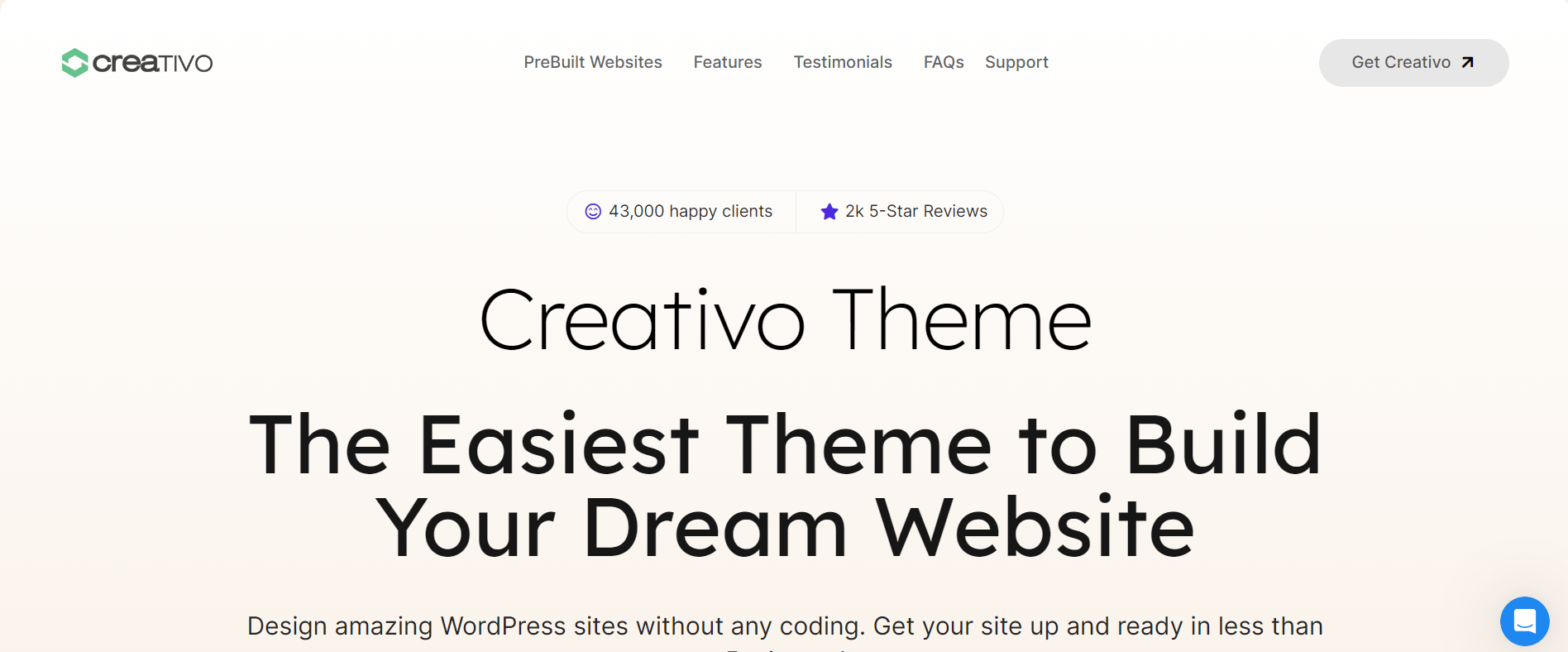
Compared to BlueHost, Elementor offers an extensive range of templates and designs, with over 100 responsive website kits covering various categories like business, creative, education, and more, directly available through Elementor’s platform. Additional sources like Envato Elements, Template Monster, and others provide a wider selection, including free and premium options, catering to diverse web design needs. These templates are designed to be user-friendly, facilitating easy customization and quick website development across different sectors. With options for various niches and functionalities, Elementor and its ecosystem of third-party templates enable users to quickly deploy professional-looking websites.


Get a head start on website creation with AI
Create a custom website tailored to your business needs 10X faster with 10Web AI Website Builder!
Ease of use
Ease of useReflects the platform’s overall user-friendliness.Score
Components:
- Learning curve (40%): Quickness and ease of getting started.
- Interface design (30%): Simplicity and intuitiveness of layout.
- User guidance (20%): Quality of tutorials and support.
- Flexibility (10%): Adaptability to various user skills.
 8.2
8.2
 8.8
8.8
🏆 Winner: Elementor
. Scoring 8.8, Elementor edges out BlueHost, which scored 8.2, in terms of ease of use. Elementor’s user-friendly interface and drag-and-drop functionality make it a great choice for both beginners and professionals. While BlueHost also offers a user-friendly interface and a range of templates, Elementor’s wider range of pre-designed templates and widgets make it slightly easier to use.
Learning Resources
🏆 Winner: Elementor
. Both platforms offer extensive learning resources, but Elementor goes a step further with its Elementor Academy and a variety of free resources such as blogs, eBooks, and YouTube channels. BlueHost’s WordPress Academy also offers comprehensive resources, but Elementor’s resources are more diverse and accessible.
For ecommerce
EcommerceMeasures the platform’s effectiveness in supporting online business activities.Score Components:
- Ecommerce themes and templates (20%): Variety and design of templates.
- Product management (25%): Ease of managing and organizing products.
- Payment options (25%): Variety and convenience of payment methods.
- Ecommerce features (20%): Features for managing an ecommerce store.
- Integration (10%): Compatibility with external e-commerce tools and services.
 6.8
6.8
 7.6
7.6
When it comes to ecommerce, both BlueHost and Elementor offer robust features through their integration with WooCommerce. However, they differ in their offerings and ease of use.

|

|
|
|---|---|---|
|
Ecommerce themes and templates |
6.5 |
7.8 |
|
Product page customization |
7.0 |
8.4 |
|
Payment processing and commissions |
6.8 |
7.5 |
|
POS capabilities |
0.0 |
5.5 |
|
Payment gateways |
7.5 |
7.0 |
|
Product numbers |
6.0 |
7.0 |
|
Additional ecommerce features |
6.5 |
8.0 |
BlueHost ecommerce features:
- Product Listings
- Shopping Carts
- Secure Payment gateways
- Shipping Options and Tax Calculations
- Inventory Management
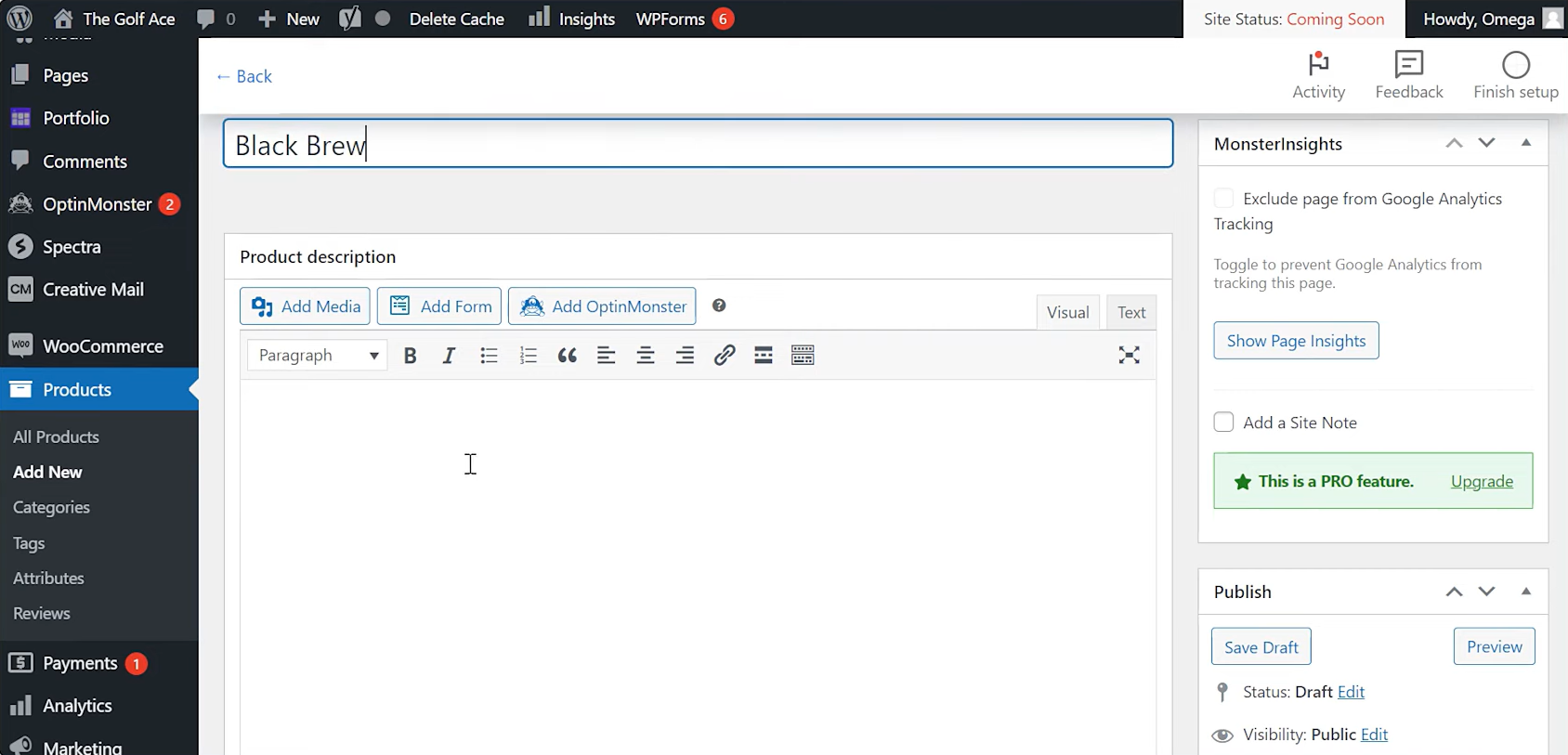
Elementor ecommerce features:
- WooCommerce Integration
- Customizable Product Pages
- Ecommerce Widgets
- Product Categories and Filters
- Shopping Cart Customization
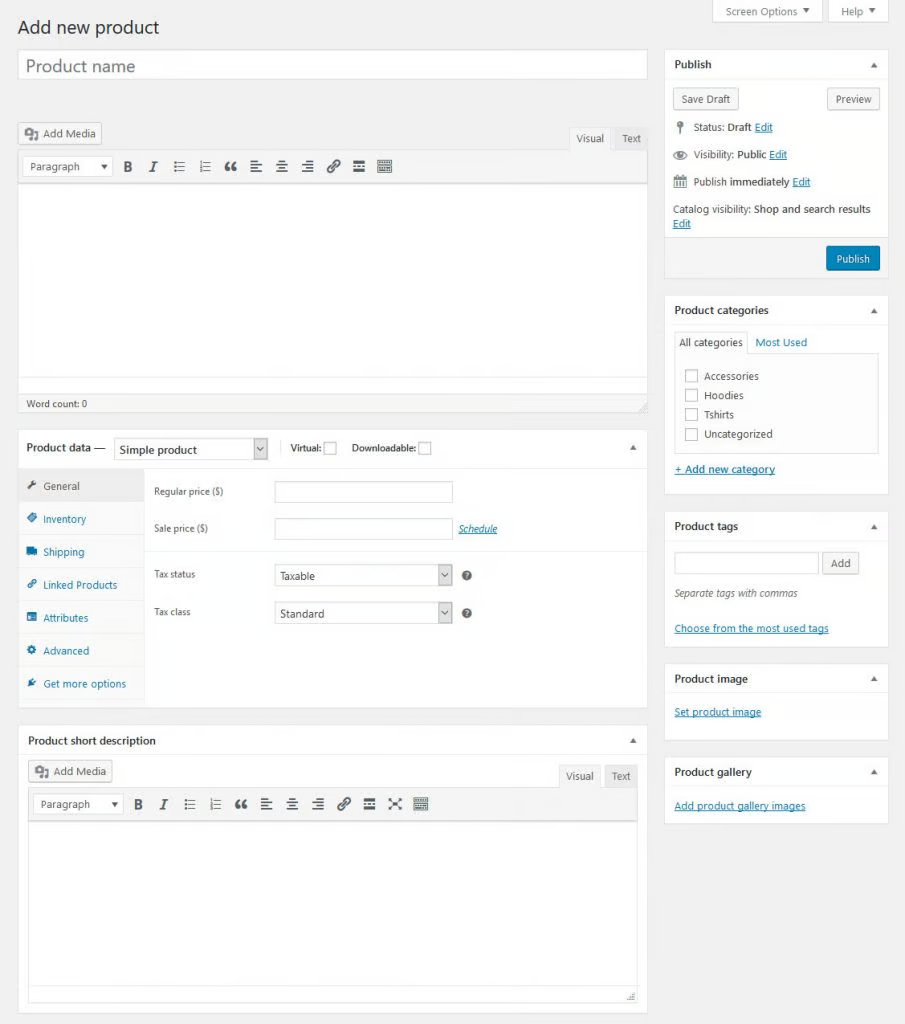
Ecommerce themes & templates
BlueHost’s website builder for eCommerce provides a selection of specific templates designed to streamline the creation of online stores. These templates are optimized for sales, featuring designs that accommodate product galleries, shopping carts, and checkout processes. However, the customization options might be limited compared to more specialized eCommerce platforms.
On the other hand, Elementor offers a diverse range of ecommerce-specific templates suitable for various online stores. These templates are designed to be mobile-responsive and SEO-friendly, ensuring optimal performance across devices and search engines. With a focus on user experience, Elementor templates allow for easy customization, including color and font changes, addition of product pages, and optimization for mobile use.
Product page customization
BlueHost’s website builder offers robust customization features for product pages, allowing users to tailor product details like titles, descriptions, images, and pricing according to their preferences. It supports the creation of product variants and options, facilitating the sale of items with multiple choices such as size, color, and material directly from the product page.
Elementor offers extensive customization options for WooCommerce product pages, including custom layouts, WooCommerce widgets for various product elements, and options for styling product galleries and ‘Add to Cart’ buttons. It allows for the display and customization of product variants, although the number of variants is technically limited by WooCommerce, not Elementor.
Payment processing
BlueHost doesn’t directly support numerous payment gateways. However, it does integrate with WooCommerce, a platform that facilitates integration with various payment gateways like PayPal and Stripe. While BlueHost doesn’t impose transaction fees, the payment gateways might.
Elementor supports several payment gateways, notably through plugins and integrations, with Stripe and PayPal being prominent options for simple and widespread use. These gateways charge their own transaction fees, typically around 2.9% + $0.30 per transaction, but Elementor itself does not impose additional fees for transactions.
Considering the features, availability, cost, and flexibility, Elementor appears to be a more robust and flexible ecommerce solution compared to BlueHost. However, if you are located in the US and are looking for a more budget-friendly option with some free extras, BlueHost might still be worth considering.
Website Editors
Website EditorsEvaluates the platforms’ website building and editing capabilities.Score Components:
- Customization tools (40%): Range and power of editing features.
- Editor usability (30%): User experience within the editor.
- Design flexibility (20%): Freedom in layout and design changes.
- Update and maintenance ease (10%): Simplicity of updating and maintaining the site.
 7.3
7.3
 8.5
8.5
🏆
Winner: Elementor
. Elementor, with a score of 8.5, offers a drag-and-drop interface that makes it easy to customize layouts, add content, and style websites visually in real-time. With a wide array of widgets and templates, users can effortlessly design complex elements such as sliders, forms, and animated headlines. Additionally, Elementor provides responsive design options, ensuring websites look great on all devices, alongside advanced features like custom CSS, role-based access control, and integration with a variety of marketing tools.
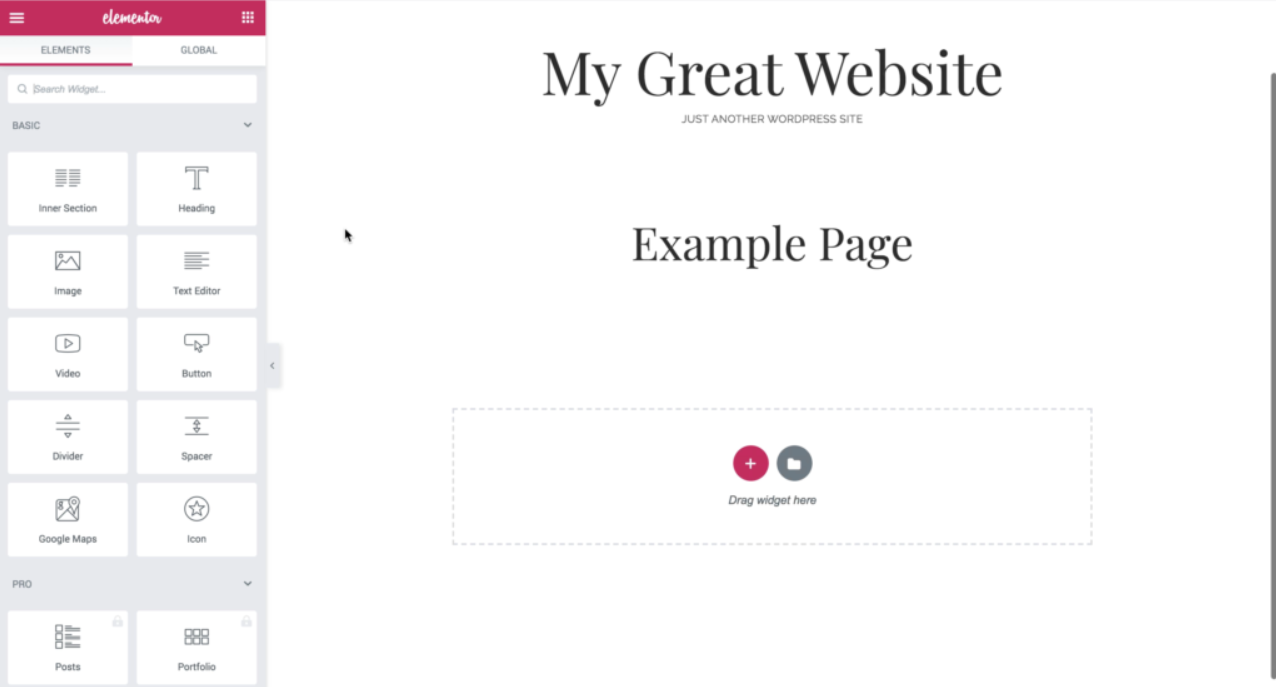
BlueHost’s website builder editor, scoring 7.3, is designed for ease of use, catering to both beginners and advanced users. It offers a section based drag-and-drop interface, allowing users to easily add, remove, and customize elements on their website without needing to code. Users can choose from a wide range of templates and customize them to fit their brand, including adjusting layouts, colors, and fonts. Additionally, the editor provides access to stock photos, SEO tools, and responsive design features, ensuring websites look great on all devices and can rank well on search engines.
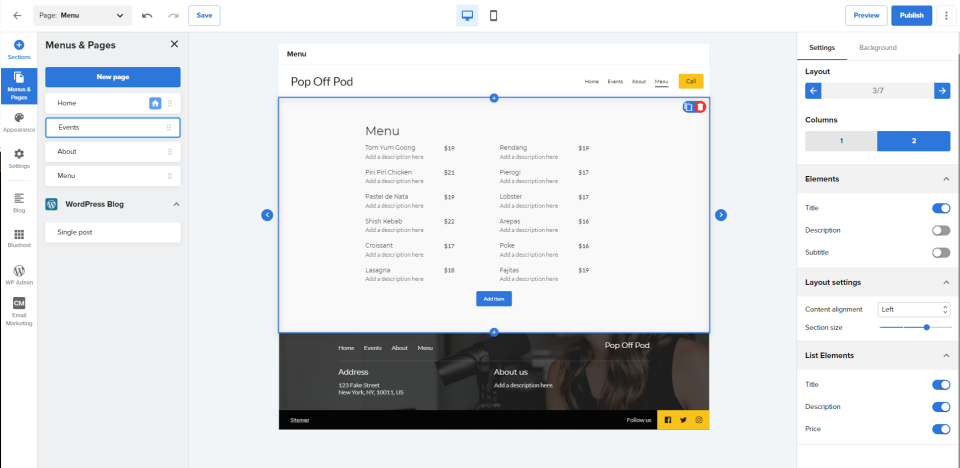
Mobile editor/app
 5.0
5.0
 0
0
🏆
Winner: BlueHost
. Neither BlueHost nor Elementor offer a dedicated mobile editor app. However, BlueHost allows users to edit their websites on a mobile browser, albeit with some limitations. This gives BlueHost an edge over Elementor, which does not provide a mobile editor at all. Therefore, if mobile editing is a priority for you, BlueHost would be the better choice.
Product testing options
Product Testing OptionsAssesses the options for trying out platform features before commitment.Score Components:
- Trial quality (40%): Extent and usefulness of the trial or free version.
- Feature accessibility (30%): How many features are available to test.
- Trial duration (20%): Length of the trial period.
- Ease of transition (10%): Smoothness of moving from trial to paid plans.
 6.2
6.2
 5.6
5.6
Overall Result
:
BlueHost Wins
. BlueHost scores 6.2 in product testing options, slightly higher than Elementor’s 5.6. Both BlueHost and Elementor do not offer a trial version, but they allow testing of premium features during a refundable period. BlueHost does not have a free version, while Elementor offers a free version but only for self-hosted WordPress.org. Both platforms provide a 30-day money-back guarantee.

|

|
|
|---|---|---|
|
Free Plan |
No | Yes, but only for self-hosted WordPress.org |
|
Trial Duration |
No | No |
|
Testing Premium Features |
Possible within 30-day refundable period | Possible during the refundable period |
|
Money Back Guarantee |
30-day money back guarantee | 30-day money back guarantee |
Price
PriceLooks at the cost-effectiveness and value for money of each platform.Score Components:
- Plan value (40%): What each pricing tier offers.
- Transparency and clarity (30%): Clearness of pricing structures.
- Flexibility of plans (20%): Range of options to suit different budgets.
- Hidden costs (10%): Additional expenses not included in the plan.
 7.2
7.2
 8.0
8.0
Elementor offers a more affordable pricing structure compared to BlueHost, but BlueHost provides a wider range of features and services, including hosting.

|

|
|
|---|---|---|
|
$0-$10 |
No offering at this amount. |
Basic ($9.99/month): 1 website, with 10GB SSD storage, 25k monthly visitors, 30GB monthly bandwidth, daily auto backups stored for 14 days, Cloudflare CDN, and integrated caching tool Value for price: 6.5 |
|
$10-$20 |
Basic ($15.99/month): Made for a simple website or blog, 1 website with 10GB SSD storage, Free CDN, Free Domain 1st year, Managed WordPress Hosting, Free SSL 1st year and Chat Support Value for price: 6.5 |
Business ($19.99/month): 1 website, with 20GB SSD storage, 50k monthly visitors, 50GB monthly bandwidth, daily auto backups stored for 30 days, Cloudflare CDN, integrated caching tool and access to staging environment Value for price: 7.5 |
|
$20-$30 |
Choice Plus ($27.99/month): Ideal for multiple sites needing storage, security, backups, 3 websites with 40GB SSD storage, Free CDN, Free Domain 1st year, Managed WordPress hosting, Free SSL, Free Domain privacy 1st year, Malware scanning, daily site backups are free for the 1st year with the purchase of a 12 or 36-month package. Otherwise, users are required to pay a one-time fee of $35.88 for backup services. Value for price: 7.5 |
Grow ($22.99/month): 3 websites, with 30GB SSD storage, 75k monthly visitors, 75GB monthly bandwidth, daily auto backups stored for 30 days, Cloudflare CDN, integrated caching tool, access to staging environment and site cloning Value for price: 8.5 |
|
$30-$35 |
Online Store ($32.99/month): Great for all online selling, built-in eCommerce tools, 3 websites with 40GB SSD storage, Free CDN, Free Domain 1st year, Managed WordPress hosting, Free Domain privacy 1st year, Malware Scanning, Exclusive Theme Store, Store Analytics, Unlimited products, Secure Payment options, Bookings & appointments, Shipping labels, product search and filtering, daily site backups are free for the 1st year with the purchase of a 12 or 36-month package. Otherwise, users are required to pay a one-time fee of $35.88 for backup services. Value for price: 8.5 |
No offering at this amount. |
|
$35+ |
Pro ($39.95/month): Perfect for high traffic, advanced storage, security, 5 websites with 100GB SSD storage, Free CDN, Free Domain 1st year, Managed WordPress hosting, Free SSL, Free Domain privacy 1st year, Malware Scanning, daily site backups are free for the 1st year with the purchase of a 12 or 36-month package. Otherwise, users are required to pay a one-time fee of $35.88 for backup services. Value for price: 9.0 |
Scale ($49.99/month): 10 websites, with 40GB SSD storage, 100k monthly visitors, 100GB monthly bandwidth, daily auto backups stored for 30 days, Cloudflare CDN, integrated caching tool, access to staging environment and site cloning Value for Price: 9.0 |
location. As a result in rare cases the prices displayed here can differ from the ones you see on their
websites.
Hosting quality
Hosting
qualityExamines the reliability and performance of the hosting solutions.Score Components:
- Uptime (40%): Consistency and reliability of website availability.
- Speed (30%): Loading times and performance.
- Bandwidth and storage (20%): Sufficiency of resources provided.
- Data centers (10%): Quality and distribution of hosting infrastructure.
 8.0
8.0
 7.8
7.8
Winner: BlueHost
. BlueHost and Elementor both offer managed WordPress hosting with a 99.9% uptime guarantee. However, BlueHost has a wider global presence with six data centers compared to Elementor’s single data center. This gives BlueHost an edge in terms of reliability and speed, especially for websites with a global audience.

|

|
|
|---|---|---|
|
Do they offer hosting? |
Yes, offers a range of hosting options |
Yes, included in all their plans |
|
Data Centers: |
6 data centers: Orem and Provo, Shanghai, Mumbai and Hong Kong, London |
1 data center in Belgium |
|
Type of hosting: |
Managed WordPress Hosting |
Managed WordPress Hosting |
|
Uptime: |
99.9% |
99.9% |
|
Uptime Guarantee: |
Yes, 99.9% |
Yes, 99.9% |
Website Speed Optimization
Website Speed OptimizationEvaluates optimization of website loading timesScore Components:
- PageSpeed Score (30%): Google’s score indicating performance optimization.
- Loading Time (30%): The average time until a website is fully interactive.
- Mobile Optimization (15%): Optimization effectiveness for mobile devices.
- Resource Optimization (15%): Optimizing images, scripts, and other heavy resources.
- CDN Usage (10%): Use of CDN to enhance speed across geolocations.
 6.5
6.5
 6.7
6.7
🏆 Winner: Elementor
Both BlueHost and Elementor prioritize website performance and page speed, but Elementor has a slight edge due to its comprehensive speed optimization strategies.

|

|
|
|---|---|---|
|
Focus |
CDN, Server Optimization |
Lazy Loading, Code Minification, Caching, CDN |
|
Performance Tools |
Google Lighthouse, PageSpeed Insights |
Google PageSpeed Insights Integration |
|
Key Strategies |
CDN, Server Optimization |
Lazy Loading, Code Minification, Caching, CDN |
|
Load Times |
Varies widely, depending on optimization and website complexity |
Varies depending on optimization and website complexity |
|
Page Speed Scores Range |
Varies widely, depending on optimization and website complexity |
Varies depending on optimization and website complexity |
|
Core Web Vitals Improvement |
Emphasis on LCP, FID, CLS improvements |
No information disclosed |
Elementor, a popular website builder plugin for WordPress, offers a wide range of speed optimization strategies, including lazy loading, code minification, caching, and content distribution networks (CDN). However, Elementor does not disclose any information about its Core Web Vitals improvements. The load times and PageSpeed scores vary depending on the optimization and website complexity.
On the other hand, BlueHost, a comprehensive web hosting service that also offers a user-friendly website builder, focuses on CDN and server optimization for speed enhancement. It also emphasizes on improving the Largest Contentful Paint (LCP), First Input Delay (FID), and Cumulative Layout Shift (CLS) for Core Web Vitals. Similar to Elementor, the load times and PageSpeed scores of BlueHost also vary widely, depending on the optimization and website complexity.
Get a head start on website creation with AI
Create a custom website tailored to your business needs 10X faster with 10Web AI Website Builder!
Plugins and integrations
Plugins and integrationsMeasures the range and effectiveness of additional plugins and integrations.Score Components:
- Variety of options (40%): Range of available add-ons.
- Integration smoothness (30%): Ease of integrating plugins into the site.
- Quality of plugins (20%): Functionality and reliability of the options.
- Custom integration capabilities (10%): Support for custom or third-party integrations.
 9.1
9.1
 7.6
7.6
🏆 Winner: BlueHost.
With a score of 9.1, BlueHost takes the lead in this category. It offers a vast ecosystem of plugins and extensions, thanks to its seamless integration with WordPress. This allows users to enhance their websites with advanced SEO tools, e-commerce functionalities, custom forms, and integrations with third-party services and platforms.
Elementor, scoring 7.6, also offers a wide range of add-ons, both free and premium, to enhance website building. It provides advanced widgets, modules, and complete theme building capabilities for deep customization. However, the sheer volume and versatility of plugins available with BlueHost give it the edge in this comparison.
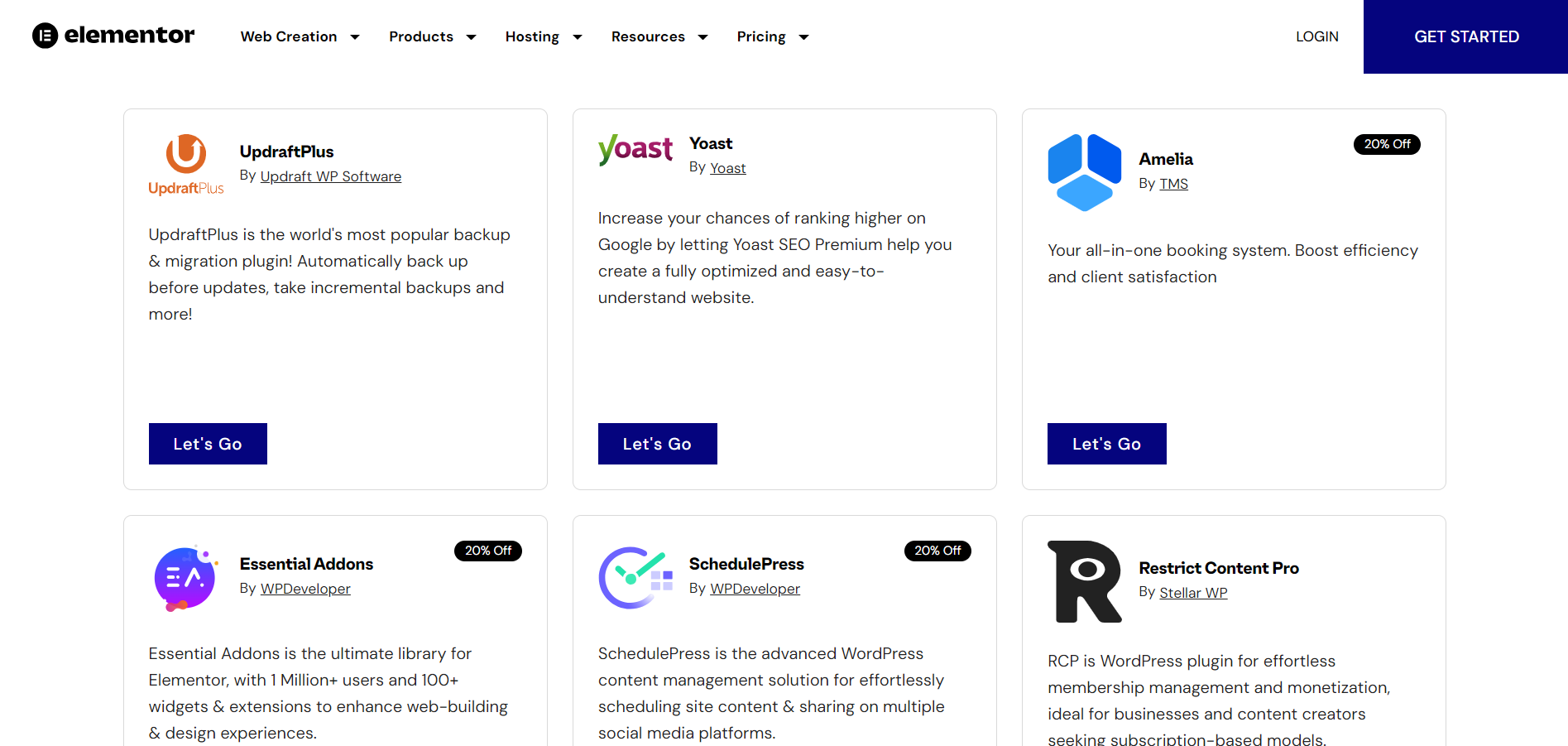
Marketing Features
Design FunctionalitiesRepresents how well each platform allows for creative design and customization of websites.Score Components:
- Template Variety (30%): Range and quality of design templates.
- Customization (30%): Flexibility and options for design alterations.
- User Interface (20%): Ease and intuitiveness of the design process.
- Responsiveness (10%): Adaptability to different devices and screen sizes.
- Innovation (10%): Unique design features and tools.
 7.3
7.3
 7.8
7.8
🏆
Overall Winner: Elementor
. Elementor edges out BlueHost with a slightly higher score, indicating a more comprehensive set of marketing tools. Both platforms offer a range of features, but Elementor’s flexibility and extensive customization options give it the upper hand.

|

|
|
|---|---|---|
|
SEO Tools |
Yes, both built in and third party WordPress plugins integrations |
Yes, with integration of various SEO plugins |
|
Email Marketing |
Yes, with using the Creative Mail plugin |
Yes, with integration of various email marketing services and plugins |
|
Blogging |
Yes, using WordPress blogging tools |
Yes |
|
Social Media Integration |
Yes |
Yes, integration of social media buttons |
|
Analytics and Reporting |
Yes, integration of Google Analytics and other WordPress plugins |
Yes, with integration of Google Analytics |
|
Ads and Promotions |
Yes |
Yes |
Customer Support
Customer supportEvaluates the quality and availability of support options.Score Components:
- Response time (40%): Speed of support responses.
- Support quality (30%): Effectiveness and helpfulness of the support.
- Availability (20%): Range of support channels (phone, chat, email).
- Resource richness (10%): Quality of self-help and educational materials.
 7.6
7.6
 7.2
7.2
🏆 Winner: BlueHost
. Comparing BlueHost vs Elementor, BlueHost takes the lead in this category with its comprehensive 24/7 customer support options, including chat and phone support for general inquiries, and technical assistance available from 7 a.m. to midnight EST. BlueHost’s commitment to providing round-the-clock assistance ensures that users can get help whenever they need it, making it a reliable choice for those who prioritize accessible support.
Elementor also offers robust customer support with 24/7 availability through ticketing and live chat support. While it ensures global accessibility with Customer Experience agents located around the world, it falls slightly behind BlueHost in terms of the variety of support options and specific availability for technical assistance. Nonetheless, Elementor’s support is praised for its responsiveness and effectiveness in resolving user issues.
Security
SecurityLooks at the platforms’ security measures and data protection.Score Components:
- Data protection (40%): Safeguards for user and customer data.
- SSL and encryption (30%): Implementation of secure connections.
- Compliance (20%): Adherence to industry security standards.
- Regular updates (10%): Frequency of security updates and patches.
 8.3
8.3
 9.1
9.1
🏆
Winner: Elementor
. Elementor edges out BlueHost with a higher security score, thanks to its robust security measures. Elementor leverages Google Cloud’s infrastructure for high security, including end-to-end encryption. It also employs both active and passive security measures, including 24/7 monitoring, regular updates, backups, and specialized security protocols to protect against common threats. Elementor’s commitment to security is further emphasized by its ISO 27001 certification and a proactive Bug Bounty program.
BlueHost, on the other hand, also prioritizes data protection through SSL certificates, regular backups, and additional security features like SiteLock for malware scanning. They provide automated backups to safeguard website data, allowing for easy restoration in case of loss or compromise. The hosting service incorporates secure configuration options and plugins, especially for WordPress hosting, to bolster website defenses. Additionally, BlueHost implements 24/7 monitoring to promptly detect and respond to security threats, along with malware scanning and removal processes to protect websites from malicious software, ensuring a secure and reliable hosting environment for users.
AI Capabilities
AI capabilitiesMeasures the effectiveness of AI-driven features and tools.Score Components:
- Automation efficiency (40%): Impact of AI on streamlining processes.
- Personalization (30%): AI-driven customization for users or customers.
- AI-Assisted design (20%): Role of AI in website design and functionality.
- Data analysis (10%): Use of AI in interpreting user data and analytics.
 1.5
1.5
 7.4
7.4

|

|
|
|---|---|---|
|
AI Builder |
|
Elementor’s AI builder offers text, custom codes, and image generation |
|
AI Ecommerce features |
|
Elementor provides AI-driven features for eCommerce websites |
|
AI content generation |
|
Elementor’s AI content generation capabilities enhance website creation |
|
Additional AI features |
|
Elementor allows integration of many third-party AI powered WordPress plugins or widgets |
🏆 Winner: Elementor
. Elementor, with a score of 7.4, offers a range of AI capabilities including an AI builder, AI-driven features for eCommerce websites, AI content generation, and the ability to integrate third-party AI powered WordPress plugins or widgets. On the other hand, BlueHost, with a score of 1.5, does not have any AI capabilities.
User Management
User ManagementAssesses the platforms’ capabilities in managing user roles, permissions, and accessibility.Score Components:
- Role Customization (40%): Flexibility in creating and defining user roles and
permissions. - Ease of Management (30%): User interface and tools for managing users.
- Access Control (20%): Effectiveness of access control measures for different user
levels. - Scalability (10%): Ability to manage a growing number of users efficiently.
 4.4
4.4
 8.8
8.8
🏆 Winner: Elementor
. Both BlueHost and Elementor support multi-user management, but Elementor provides more detailed information about user roles and permissions.
- BlueHost supports multi-user management, but there’s no specific information about the number of users or their roles and permissions.
- Elementor’s user management is based on the roles and permissions set within WordPress. Administrators have full access to edit any part of the site, including Elementor settings, while Editors can manage posts and pages made with Elementor. Authors and Contributors have limited capabilities. Elementor Pro offers a Role Manager feature, enabling further customization of what different roles can do within Elementor.
Elementor User Roles and Access Levels:
| Role | Description | Access Highlights |
|---|---|---|
| Administrator | Users with full access to all administration features, including Elementor settings. | Can edit all content, Access to Elementor settings, Can install plugins and themes, Can manage users |
| Editor | Users who can manage and publish content including pages and posts. | Can edit pages/posts created with Elementor, Cannot access Elementor settings, Can manage categories, tags, and links, Can moderate comments |
| Author | Users who can publish and manage their own posts. | Can create posts with Elementor, Cannot edit pages, Limited access to media library, Cannot access Elementor settings |
| Contributor | Users who can write and manage their own posts but cannot publish them. | Can create content with Elementor, Cannot publish or edit pages, No access to Elementor settings, Submissions require review by higher-level roles |
Additional Features

|

|
|
|---|---|---|
|
SSL Certificate |
|
|
|
Custom Domain |
|
|
|
Free Custom Domain Included |
|
|
|
International Domains |
|
|
|
Mobile Responsive |
|
|
|
Page Speed |
|
|
|
Website Builder Mobile App |
|
|
|
Convert a Website To An App |
|
|
|
Website Analytics |
|
|
|
Multilingual Sites |
|
|
|
Multiple Users |
|
|
BlueHost vs Elementor: User Feedback
Users appreciate BlueHost for its comprehensive free offerings, including SSL, subdomains, and custom email, along with additional services like free domain registration and CDN. The platform’s intuitive interface and user-friendly website builder cater to both beginners and experienced developers. However, concerns arise regarding the significant price increase upon renewal, limited free website templates, and unresolved technical issues with poor customer support, hindering users’ ability to effectively manage their websites and businesses. Addressing these concerns could enhance overall user satisfaction with BlueHost.
Elementor is widely appreciated for its intuitive drag-and-drop interface, enabling rapid creation of professional and responsive websites without coding skills. It offers a vast range of templates and compatibility with WordPress, making it a go-to for diverse users. Despite its benefits, concerns arise regarding website loading times, subscription costs, and occasional compatibility issues. Feedback on customer support and legacy plan management is mixed, with some users experiencing dissatisfaction. Overall, Elementor is valued for its efficiency in web development, although some aspects, particularly support services, could be improved.
The making of this blog
We followed a clear, step-by-step process to write and research this article.
BlueHost vs Elementor: FAQ
Which is better for beginners, BlueHost or Elementor?
Can I use both BlueHost and Elementor for an ecommerce website?
How do BlueHost and Elementor compare in terms of design and templates?
What about the pricing comparison between BlueHost and Elementor?
Which platform offers better customer support, BlueHost or Elementor?
Are there any differences in hosting quality between BlueHost and Elementor?
Which platform is better for SEO and marketing features?
Can I manage multiple users with BlueHost and Elementor?









